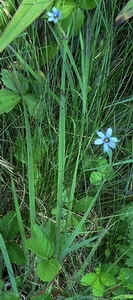 |
Common Name: Blue-Eyed Grass
Scientific Name: Sisyrinchium angustifolium
Family: Iridaceae
Blue Ridge Parkway
North Carolina
June 1, 2002
 |
The 4 - 16 inch long flattened or winged flowering stems of these grass-like plants are much like the somewhat shorter leaves in appearance. These native perennials often form large clumps that produce many flower stalks. Despite the small size of an individual flower, here shown about twice natural size, the clumps are quite colorful. A frequent plant in meadows and open, moist woodlands throughout the state and the eastern U.S. March-June [Justice, William S. and Bell, C. Ritchie, Wild Flowers of North Carolina. University of North Carolina Press, Chapel Hill, 1968]
With long, thin, grass-like leaves, this tiniest of the irises is over-looked unless in bloom. The pale to deep blue flowers sit atop flattened stems. Six dark-lined sepals and petals radiate from a central yellow spot. These identical structures have sharp tips. The dark "nectar-guides" combined with the yellow center create a bold flower to attract bees and other flying insect pollinators. Sisyrinchium can be loosely translated from the Greek to mean "hog snout". The unglamorous name is attributed to the belief that wild pigs like to root up this plant. Exotics animals such as the wild hog in the Smokies cause immense damage to the native plants. April - June [White, Peter, Wildflowers of the Smokies. Great Smoky Mountains Natural History Association, Gatlinburg, 1996]
January February March April May June July August September October November December
Alphabetical Listings -- A B C D, E F G H I, J, K L M N, O P Q, R S T U, V W X, Y, Z
Family Listings -- A B C D, E F G H I, J, K L M N, O P Q, R S T U, V W X, Y, Z
Genus Listings -- A B C D, E F G H I, J, K L M N, O P Q, R S T U, V W X, Y, Z